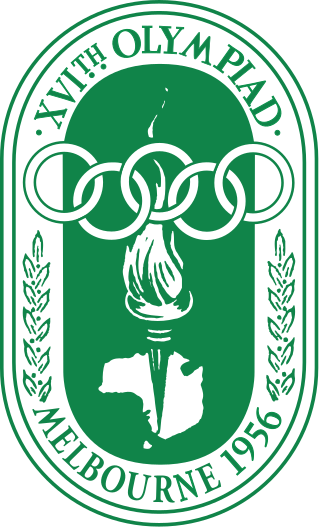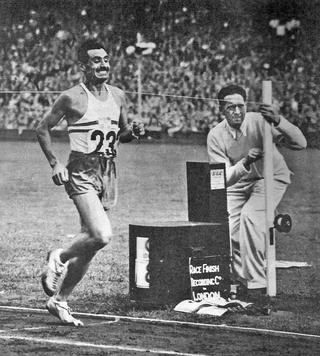
The Summer Olympic Games, also known as the Summer Olympics or the Games of the Olympiad, is a major international multi-sport event normally held once every four years. The inaugural Games took place in 1896 in Athens, Greece, and the most recent was held in 2024 in Paris, France. This was the first international multi-sport event of its kind, organized by the International Olympic Committee (IOC) founded by Pierre de Coubertin. The tradition of awarding medals began in 1904; in each Olympic event, gold medals are awarded for first place, silver medals for second place, and bronze medals for third place. The Winter Olympic Games were created out of the success of the Summer Olympic Games, which are regarded as the largest and most prestigious multi-sport international event in the world.

The 1956 Summer Olympics, officially the Games of the XVI Olympiad and officially branded as Melbourne 1956, were an international multi-sport event held in Melbourne, Victoria, Australia, from 22 November to 8 December 1956, with the exception of the equestrian events, which were held in Stockholm, Sweden, in June 1956.

The 2004 Summer Olympics, officially known as the Games of the XXVIII Olympiad, were a summer multi-sport event held in Athens, the capital city of Greece, from 13 to 29 August 2004. A total of 10,625 athletes from a record 201 countries represented by National Olympic Committees (NOC) participated in these games. The games featured featured 301 events in 28 sports and 39 disciplines, including the Olympic debuts of women's wrestling and women's sabre. Kiribati and Timor Leste competed for the first time in these Olympic Games. It was the second time after 1896 that Athens had hosted the Summer Olympics in the modern era.
The 1992 Summer Olympics, officially known as the Games of the XXV Olympiad, and officially branded as Barcelona '92, were an international multi-sport event held in Barcelona, Spain, from 25 July to 9 August 1992. A total of 9,356 athletes representing 169 National Olympic Committees (NOCs) participated. The games featured 257 events in 25 sports and 34 disciplines. Badminton, baseball, and women's judo were included as official medal events for the first time.

The 1980 Summer Olympics, officially known as the Games of the XXII Olympiad, were an international multi-sport event held in Moscow, Soviet Union, from 19 July to 3 August. They were the first Olympic Games to be staged in a communist nation. A total of 5,179 athletes representing 80 National Olympic Committees (NOCs) participated. This was the fewest number of participating NOCs since 1956, which included seven teams making their Olympic debut at the Summer Games; Angola, Botswana, Cyprus,, Jordan, Laos, Mozambique, and Seychelles. The games featured 203 events in 21 sports across 27 disciplines.

The 1976 Summer Olympics, officially known as the Games of the XXI Olympiad, were a summer multi-sport event held in Montreal, Quebec, Canada, from July 17 to August 1, 1976. A total of 6,084 athletes from 92 countries represented by National Olympic Committees (NOCs) participated in these Games, competing in 198 events in 23 sports.

The 1972 Summer Olympics, officially known as the Games of the XX Olympiad, were a summer multi-sport event held in Munich, West Germany, from 26 August through 11 September 1972. 7,134 athletes representing 121 National Olympic Committees (NOCs) participated. The games featured 195 events in 21 sports across 28 disciplines.

The 1964 Summer Olympics, officially known as the Games of the XVIII Olympiad, and commonly known as Tokyo 1964, were an international multi-sport event held in Tokyo, Japan, from 9 to 24 October. A total of 5,151 athletes representing 93 National Olympic Committees (NOCs) participated. The games featured 163 events across 19 sports and 24 disciplines. Two new sports were introduced to the Summer Olympic Games program in Tokyo: judo and volleyball. The inclusion of volleyball marked the first time that a women's team sport had been introduced.
The 1952 Summer Olympics, officially known as the Games of the XV Olympiad and commonly known as Helsinki 1952, were an international multi-sport event held from 19 July to 3 August 1952 in Helsinki, Finland. A total of 4,955 athletes representing 69 National Olympic Committees (NOCs) participated, which included 12 teams making their Olympic debut at the Summer Games: The Bahamas, Guatemala, Hong Kong, Indonesia, Israel, Netherlands Antilles, Nigeria, People's Republic of China, Saar, the Soviet Union, Thailand, and Vietnam. The games featured 149 events across 17 sports in 23 disciplines, including the Olympic debut of women's gymnastics events and the transition of equestrian sports becoming mixed.

The 1948 Summer Olympics was an international multi-sport event held from July 29 through August 14, 1948, in London, United Kingdom. It was the first Olympic Games to take place in twelve years, due to the Second World War, with London being chosen as the host city in May 1946.

The 1936 Summer Olympics, officially known as the Games of the XI Olympiad, was an international multi-sport event held in Berlin, Germany, from 1 August to 16 August.
The 1932 Summer Olympics, officially known as the Games of the X Olympiad, was an international multi-sport event held in Los Angeles, California, United States, from July 30 to August 14.
This 1928 Summer Olympics medal table comprises two tables of countries ranked by the number of medals won during the 1928 Summer Olympics.

The 1920 Summer Olympics, now officially known as the Games of the VII Olympiad, were an international multi-sport event held in Antwerp, Belgium, from August 14 to September 12, 1900. A total of 2,622 athletes representing 29 National Olympic Committees (NOCs) participated. The games featured 162 events in 29 disciplines. Willis Lee won five gold medals and 7 total medals at the 1920 Summer Olympics, the most of any competing athlete.

The 1904 Summer Olympics were held in St. Louis, Missouri, United States from July 1 to November 23, 1904, as part of the St. Louis World's Fair.

The 1900 Summer Olympics, now officially known as the Games of the II Olympiad, were an international multi-sport event held in Paris, France, from May 14 to October 28, 1900, as part of the 1900 World's Fair. A total of 1,226 athletes representing 26 National Olympic Committees (NOCs) participated. The games featured 95 events in 19 sports. Archery, Basque pelota, cricket, croquet, equestrian jumping, football, golf, polo, rugby union, rowing, sailing, tug of war, and water polo were contested for the first time at these Games. Women competed in the Olympics for the first time during the 1900 games. Athletes representing 19 NOCs received at least one medal. France won the most of every type of medal, while the United States won the second-most of every type of medal. Spain, Cuba, the Netherlands, Italy, and Belgium all won their nation's first Olympic gold medals. Belgium, Italy, Netherlands, Cuba, Spain, Norway, India, Bohemia, and Sweden all won their nation's first Olympic medals of any kind.

The 1964 Winter Olympics, officially known as the IX Olympic Winter Games, were a winter multi-sport event held in Innsbruck, Austria, from 29 January to 9 February. A total of 1,091 athletes representing 36 National Olympic Committees (NOCs) participated, including India, Mongolia, and North Korea, who took part in the Winter Games for the first time. The games featured 34 events in 6 sports across 10 disciplines, including the Olympic debut of Luge.

The 1960 Winter Olympics, officially known as the VIII Olympic Winter Games and also known as Squaw Valley 1960, were a winter multi-sport event held from February 18 to 28, 1960, at the Squaw Valley Resort in Squaw Valley, California, United States. A total of 665 athletes representing 30 National Olympic Committees (NOCs) participated, including South Africa who took part in the Winter Games for the first time. It was the first time all five continents represented in the Olympic rings were represented in the Winter Games.

The all-time medal table for all Olympic Games from 1896 to 2024, including Summer Olympic Games, Winter Olympic Games, and a combined total of both, is tabulated below. These Olympic medal counts do not include the 1906 Intercalated Games which are no longer recognized by the International Olympic Committee (IOC) as official Games. The IOC itself does not publish all-time tables, and publishes unofficial tables only per single Games. This table was thus compiled by adding up single entries from the IOC database.

















